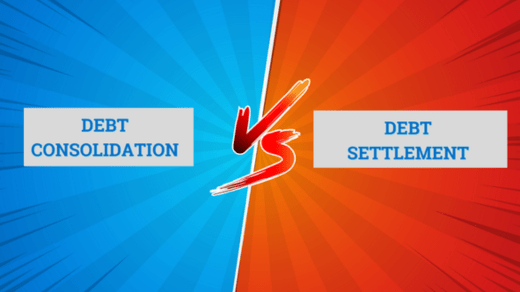Debt Consolidation Vs Debt Settlement

Debt consolidation and debt settlement are both taken to be financial strategies for enhancing personal debt load, however they are pretty different in how they resolve varied issues. In addition, debt settlement lowers the overall amount of debt owed, whereas debt consolidation lowers the overall number of creditors a person owes. Learn about the advantages and disadvantages of each strategy.
Key Takeaways
- Debt consolidation and debt settlement both assist to lower the debt load however in numerous ways.
- Debt settlement reduces the total debt owed, however debt consolidation also lowers the total number of creditors that a person owes.
- With debt consolidation, multiple loans are all easily rolled into a novel consolidation loan that has a single monthly rate of interest.
- With debt settlement, either a person or a credit counselor negotiates with the creditors so that they can pay a readers amount than what they personally owe.
What Is Debt Consolidation?
Debt consolidation is a kind of process in which they combine multiple debts into a single consolidation loan. This is understood as a single loan that rolls all of the prior debts into one loan, resulting in a single monthly payment at one interest rate.
Debt consolidation loans are offered through banks, credit unions, as well as the online lenders—along with the debt payments are also made to the novel lender going ahead.
Consolidating debt in such a way can easily relieve the stress of having to juggle multiple debt payments every month. A debt consolidation loan may possibly result in a reduced overall monthly payment or a reduced average interest rate on the debt. Whether a person is able to save money on interest over time may depend on the length of the loan repayment term and/or whether one must pay any fees for the loan, for instance application or origination fees.
A debt consolidation loan may be secured or unsecured. Secured debt consolidation loans must require one or more assets such as collateral, for example the home, car, retirement account, or insurance policy. For instance, if a person takes out a home equity loan to consolidate debt, then the home would secure the loan.
Debt consolidation could assist to enhance the credit score if one wants to reduce credit utilization ratio, however it’s significant to monitor the credit reports and scores for any possibly negative impacts.
What Is Debt Settlement?
Debt settlement uses a very different strategy. When a person settles debt, one would effectively ask one or more of the creditors to accept less than what they owe—known as a discounted payoff(DPO). If a person and their creditor(s) reach an agreement, then one would pay the settlement amount in a lump sum or a series of installments.
The benefit of debt settlement is that they can eliminate debts without having to pay the balance in complete amounts. This may be an attractive alternative to bankruptcy, even though it will also have a damaging effect on the credit history.
Make sure to keep in mind that creditors are already taken to be under no obligation to enter negotiations or accept the offer. In addition, providing a settlement needs to have capital on hand to pay agreed-upon amounts. If a person usually doesn’t have the capital to negotiate with, then in order to seek a debt consolidation loan may be the improved option.
Typically, creditors will also consider debt settlement for accounts that are predominantly past due. Henceforth, if one would still current on the balances, then this may not be an option.
| Debt Consolidation vs. Debt Settlement: Key Differences | ||
| Debt Consolidation Loan | Debt Settlement Loan | |
| How it works | Debts are combined into a single loan with one rate of interest. | Debt balances are easily negotiated to pay less than what’s owed. |
| Credit score impact | May assist to enhance credit scores if it lowers the credit utilization ratio. | Late and past-due payment history for a settled account could hurt the credit score. |
| Cost | Rate of Interest for debt consolidation loans vary; various lenders may also charge fees. | Debt settlement may cost nothing if one does it oneself, debt settlement companies charge a fee for such services. |
| Pros | Combining debts into a single payment could make repayment easier, as well as one might be able to save capital on interest. | One can eliminate debts for less than what’s owed as well as might head off collection actions,to include creditor lawsuits. |
| Cons | Depending on the length of the loan term, one could pay more in overall interest over a period of time. | Not all creditors may agree to a debt settlement, as well as the late payment history will harm the credit rating. Any forgiven debt may be taxed as income as well. |


